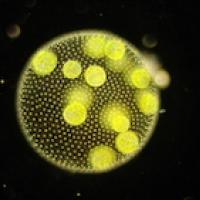
In a tank in an underground laboratory in Cambridge a little green alga is executing a powerful breaststroke. It belongs to a group of algae called volvocales and it doesn't have a brain. So how can it coordinate its tiny little "arms" to perform motions worthy of an Olympic swimmer?
In 2019 we visited Ray Goldstein, Schlumberger Professor of Complex Physical Systems at Cambridge, and he explained how algae manage to synchronise their so-called flagella, what this means for human physiology, and how it sheds light on the evolution of multi-cellular organisms from single-celled ones.
You can also read our article on Goldstein's work with volvocales, or watch an interview with Goldstein in this video.
Sound effects in this podcast are from Robinhood76 and 16HPanskaKanclirova_Victoria on freesound.org.

This podcast was partially funded by the European Mathematical Society.